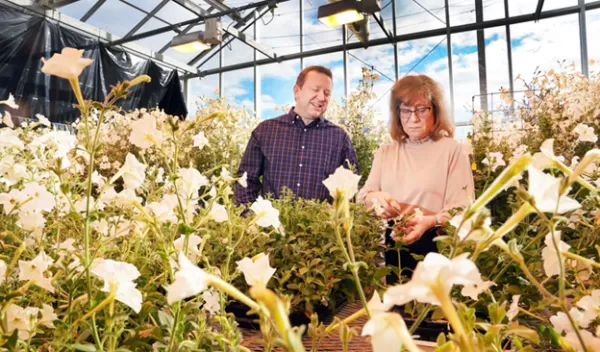
Biologists, chemical engineers collaborate to reveal complex cellular process inside petunias
Flowers emit scent chemicals called volatile organic compounds, or VOCs. Now, a Purdue University team has published a paper in Nature Communications identifying for the first time a protein that plays a key role in helping petunias emit floral volatiles.
Natalia Dudareva, who led the study, and collaborator John Morgan had suggested that molecular processes could be involved in VOC emission.
The new work builds on Dudareva’s and Morgan’s previous findings showing that the plants' biology helps control the release of their scent compounds. The recent paper, funded by the U.S. National Science Foundation and the U.S. Department of Agriculture, focuses on how volatiles cross the cell wall, the barrier that separates the cellular interior from a plant's outermost protective layer, the cuticle.
"We were looking at whether there are proteins that facilitate the transport of these small organic molecules across the cell wall layer," said Morgan. "The best analogy is to the transport of oxygen in muscle tissue by a protein called myoglobin."
VOCs are small molecules that have low water solubility. The cell wall, however, is a water-filled environment. This slows the diffusion rate of VOCs because their concentrations cannot build up very high.
"What happens is a protein can bind a lot of these molecules inside a non-waterlike cavity, and it improves or increases the net transport rate," Morgan said.
The work has significant practical implications, ranging from the health of the planet to industrial operations, the scientists said. Plants now emit 10 billion metric tons of carbon annually — a quantity that will increase with continued global warming. Floral volatiles help to protect plants against environmental stresses and are heavily used in the cosmetics industry and in aromatherapy.
"And our diet depends on insect-pollinated plants," Dudareva said. With global warming, flowers may start blooming earlier, before insects are ready to begin pollination."
Aruna Kilaru, a program director in NSF's Division of Integrative Organismal Systems, added, "Insights into floral VOC emissions will enable us to regulate not only odors but interactions of plants with other organisms such as pollinators, pests and pathogens that can directly impact food security."
